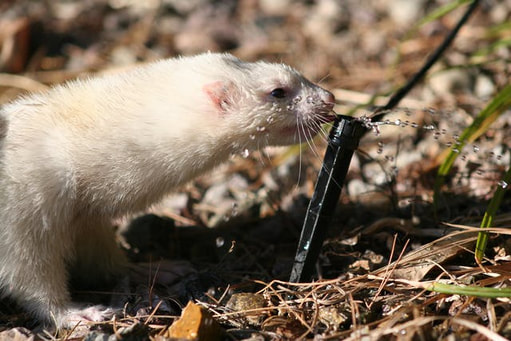Summer is here: How to recognize, Treat, and Prevent Heat Stroke in Ferrets LIFE-THREATENING EMERGENCY
Ferrets are very susceptible to extreme heat. “Heatstroke” (or “hyperthermia”) occurs when a ferret is exposed environmental conditions that cause the body to exceed a normal temperature range. Normal (rectal) body temperature for a healthy ferret is 100 to 104 degrees Farenheit (°F) or 38 to 40 degrees Centigrade or Celsius (°C). Heat stroke must be considered when the body temperature of a ferret exceeds 104° to 105°F (40° to 40.6°C) in the absence of infection or inflammation. Heat stroke can damage the body. How much damage depends on: 1) how high the body (core) temperature becomes, and 2) the length of time that it is elevated. Signs
IMMEDIATE INTERVENTION IS REQUIRED
TREATMENT Ferrets may require stabilization. The veterinarian may reduce the ferret’s body temperature by using cooling pads, cold-water enemas, or cold fluids instilled into the abdominal cavity or into the blood stream. Oxygen therapy should be given to increase the amount of oxygen to the tissues. In severe cases, the animal may need to be intubated (a tube placed in the airway for administering oxygen). Even after the body temperature has normalized, hospitalization is warranted to monitor vital signs, blood work, and to ensure that the ferret remains stable. Although the ferret may appear to recover from heat stroke, signs of organ failure or other problems m ay develop over the following days, up to a week later. Medication may be given to protect the ferret’s stomach from “stress ulcers.” Organ failure: Heat can cause gastrointestinal signs, kidney, liver, or heat problems. When severe it can result in a “shock” syndrome (disseminated intravascular coagulation- or DIC), which can lead rapidly to death. Nervous system damage can occur, as well as severe muscle injury. PREVENTION
Comments are closed.
|
Details
Archives
April 2024
Categories
All
|
|
Terms and Conditions
|
allFerrets® 2014-2024. ALL RIGHTS RESERVED.
Proudly designed by widgIT |


 RSS Feed
RSS Feed
